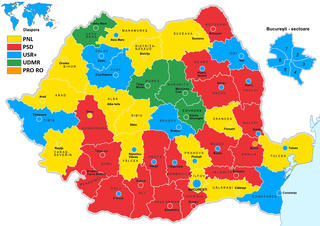This article needs additional citations for verification .(June 2011) |
The State Philharmonic Orchestra of Sibiu (Romanian : Filarmonica de Stat Sibiu) is an orchestra from Romania.
This article needs additional citations for verification .(June 2011) |
The State Philharmonic Orchestra of Sibiu (Romanian : Filarmonica de Stat Sibiu) is an orchestra from Romania.
In the 16th century, Sibiu had one of the first European schools for organ, funded by Hyeronymus Ostermayer and the city's archive contains music scores signed by composers of the 17th and 18th centuries. In 1774, at the court of Samuel von Brukenthal, governor of Transylvania, a professional orchestra held its first concert. In 1792, one year after Mozart’s death, Die Entführung aus dem Serail was played in Sibiu, and later in 1800, The Creation , by Joseph Haydn.
The State Philharmonic of Sibiu was founded on January 1, 1949. Together with the orchestra, artists from Romania and other countries have performed, among them: Ion Voicu, Valentin Gheorghiu, Ștefan Ruha, Monique de La Bruchollerie and Jean Jaques Thiollier, Sviatoslav Richter, Rudolf Kerer, Lazar Berman, Dimitri Bashkirov, Ivry Gitlis, and Montserrat Caballé.
In 2004, the location of the State Philharmonic of Sibiu was moved to Thalia Hall. Built in 1787 by Martin Hochmeister, the hall has been twice destroyed by fire during its history. The County Council of Sibiu restarted the restoration of the building in 1990. The official inauguration took place on October 7, 2004, with the music of the Symphony no. 9 by Ludwig van Beethoven.
Past Henry Selbing Petre Sbarcea (1977-2014) Gabriel Bebeșelea (2014-2017)
Current Vacant
The orchestra currently consists of: [1]
Piano: Monica Florescu
Cello: Makcim Fernandez Samodaiev, Alexandru Titus Tincu, Anca Demian, Claudia Grelus, Ina Turoiu, Zach Viorica, Silviu Chiorlise
1st violin: Marius Radu - concert master, Sergiu Fidiles - concert master, Lilia Radu, Ilia Rusnac, Vasile Șulț, Ludmila Lungu, Raluca Sfîriac, Daniel Bădăruță, Irina Dancu, Cotîrlea Iuliana, Ioan Andrei Moldovan, Ștefana Zaharia, Teodorian Popa
2nd violin: Elena Borz, Mihai Andrițcu, Ionuț Cristian Bugnar, Mădălina Tătărușanu, Eduard Dascaliuc, timea Gaudi, Costin Urlăeanu, Ioana Gavrilas, Andreea Baicu
Viola: Gabriel Silișteanu, Alina Stavăr, Aurelia Mailat, Mihaela Scheau, Terez Mihály, Tiberiu Maniu, Ioana Șulț
Double Bass: Valentin Desaga, Chirila Adam, Bartha Robert
Flute: Oana Florentina Bădescu, Cozmin Demian, Coste Carina Maria
Oboe: Lucia Dobri, Romanino Lucian Popa, Oana Cristina Avram
Clarinet: Florin Grelus, Ciprian Dancu
Bassoon: Adam Raduly, Mircea Ittu, Ovidiu Borz
Horn: Antonio Mihail, Barta Tivadar, Alin Roman
Trumpet: Medve Sandor, Dorin Petcu, Dumitru Trocin
Trombone: Ion Palagniuc, Radu Munteanu, Emanuel Dombi
Tuba: Daniel Luca
Percussion: Andrei Marcovici, Alexandru Craciun
Harp: Ileana Rotaru

Șerban Vodă Cemetery is the largest and most famous cemetery in Bucharest, Romania.

The Romania men's national basketball team represents Romania in international basketball competition. The team is administered by the Romanian Basketball Federation (FRB).

The National Theatre Bucharest is one of the national theatres of Romania, located in the capital city of Bucharest.
The Transylvania State Philharmonic Orchestra or Cluj-Napoca Philharmonic, based in Cluj-Napoca, has grown to a valuable institution of music, having a sustained presence in the Romanian and European cultural space.

The Moldova Philharmonic Orchestra is a Romanian symphony orchestra located in Iași, Romania. The name "Moldova" in the title refers to the historical region of Moldavia.

The George Enescu Festival, held in honor of the celebrated Romanian composer George Enescu, is the biggest classical music festival and classical international competition held in Romania and one of the biggest in Eastern Europe. The festival proposal was authored by Andrei Tudor in 1955. Enescu's close associate George Georgescu organized the first festival in 1958; highlights included a performance of Bach's Concerto for Two Violins with Yehudi Menuhin and David Oistrakh as soloists and a staging of Enescu's sole opera, Œdipe, with Constantin Silvestri conducting.

The I. L. Caragiale National University of Theatre and Film is a public university in Bucharest, Romania, founded in 1954. It is named in honour of playwright Ion Luca Caragiale.

The Banatul Philharmonic is a musical institution in Timișoara, Romania. Established in 1871, it now comprises a symphony orchestra, professional chorus and various chamber groups. The Banatul Philharmonic operates in the projection hall of the former Capitol cinema, built by the mayor's office in 1929, which was nationalized in 1956, so that in 2007 it would be taken over by the municipality of Timișoara, by a special law.

Aiud Prison is a prison complex in Aiud, Alba County, located in central Transylvania, Romania. It is infamous for the treatment of its political inmates, especially during World War II under the rule of Ion Antonescu, and later under the Communist regime.
Pariu cu viața is a Romanian musical phenomenon comedy-drama television series that has aired on Pro TV. It focuses on a love story between two teenagers with a big passion for music, their family connections and the life of a music group formed at their high school.

Blestemul pământului, blestemul iubirii is a 1981 Romanian drama film directed by Mircea Mureșan. The film is an adaptation of Liviu Rebreanu's 1920 social novel Ion, starring Șerban Ionescu as the titular character, a poor Transylvanian peasant.
The Ploiești Philharmonic Orchestra is a Romanian orchestra based in Ploiești, Prahova County. The orchestra's home is the Paul Constantinescu Philharmonic, located in centre of Ploiești.
Jeunesses International Music Competition Dinu Lipatti was held for the first time in 1994. The event discovers and promotes the values of the new generation of classical music, supports young artists in building a successful career and provides a platform for multicultural dialogue that encourages performance. The idea of establishing this competition started from the desire of a musician to provide in a former communist country, Romania and to create a chance for young artists to participate in an international competition in their country and to benefit from the same conditions as anywhere in the world and to give them a chance to promote cooperation with international and European musical institutions.

European Parliament elections were held in Romania on 26 May 2019.
Ioana Cristina Goicea is a Romanian-born violinist and Violin Professor at the University of Music and Performing Arts Vienna.